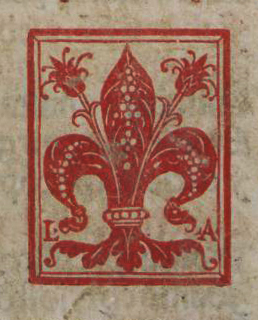The Giunti were a Florentine family of printers.[a] The first Giunti press was established in Venice by Lucantonio Giunti, who began printing under his own name in 1489.[1] The press of his brother Filippo Giunti (1450–1517) in Florence, active from 1497,[2]: 338 was a leading printing firm in that city from the turn of the sixteenth century.[3]: 31 Some thirty members of the family became printers or booksellers. A press was established in Lyon in 1520. By about 1550 there were Giunti bookshops or warehouses in Antwerp, Burgos, Frankfurt, Lisbon, Medina del Campo, Paris, Salamanca and Zaragoza,[1] and agencies in numerous cities of the Italian peninsula, including Bologna, Brescia, Genoa, Livorno, Lucca, Naples, Piacenza, Pisa, Siena and Turin, as well as the islands of Sardinia and Sicily.[4]: 174
| Giunti | |
|---|---|
 The Florentine giglio, printer's mark of Lucantonio Giunti, from a missal printed in Venice in 1521 | |
| Earlier spellings |
|
| Place of origin | Republic of Florence |
| Members | List
|

In Venice the Giunti press was the most active publisher and exporter of liturgical texts in Catholic Europe.[5]: 159
In Florence the Giunti sought an effective monopoly of music-printing. Prominent in the output of the press are bandi and laws promulgated by the Grand Dukes of Tuscany, for whom the Giunti operated virtually as an official press.
The classic bibliographic monograph, De Florentina luntarum typographia by Angelo Maria Bandini,[6] details the output of the press at Florence by year from 1497 to 1550. Bandini was able to build upon a printed catalogue of 1604.[7]
After the death of Bernardo in 1551, the presses continued to be operated by their heirs.
Origins edit
The origins of the family are unknown. The first documentary record, from 1427, finds the three brothers Luca, Giunta and Iacopo in the parish of Santa Lucia d'Ognissanti, where they lived with their mother; their father Biagio had died. Luca was ill, Giunta was a weaver, and Iacopo a labourer.[2]: 335 In 1451 Giunta's seven sons were living together within the walls of Florence; among them were Lucantonio and Filippo, founders of the family printing business.[2]: 337
Lucantonio Giunti edit
Lucantonio Giunti (1457 – 1538) was one of the seven sons of Giunta di Biagio. With his brother Bernardo, he left Florence in about 1477 for Venice, where he set up as a stationer. In 1489 he started book publishing with three titles printed by Matteo Capcasa.[1] From 1491 Giunti was constantly active as a publisher, and later as a printer too; he issued some 410 titles during his lifetime. He did not have his own printing workshop until about 1500; until that time, he employed independent typographers, most frequently Johan Emerich of Speier.[1]
See also edit
Notes edit
- ^ The surname is also found as Giunta, de Gionta, de Giunta, de Giuntis, Degionta, Deionta, Dezunta, di Giunta, Iunta, Juncta, Junta, Junte, de Zonta, de Zontis or de Zunta, Juncta, and de' Giunti Modesti.
References edit
- ^ a b c d Massimo Ceresa (2001) Giunti, Lucantonio, il Vecchio (in Italian). Dizionario Biografico degli Italiani, volume 57. Roma: Istituto dell’Enciclopedia Italiana. Accessed January 2016.
- ^ a b c William A. Pettas (1974). An International Renaissance Publishing Family: The Giunti. The Library Quarterly: Information, Community, Policy 44 (4): 334–349. (subscription required)
- ^ Tim Carter (1990). "Music-Printing in Late Sixteenth- and Early Seventeenth-Century Florence: Giorgio Marescotti, Cristofano Marescotti and Zanobi Pignoni". Early Music History 9: 27-72.
- ^ William Pettas (1997). The Giunti and the Book Trade in Lyon. In: Libri, tipografi, biblioteche. Ricerche storiche dedicate a Luigi Balsamo. Biblioteca di bibliografia italiana, 148. Firenze: I. Olschki. ISBN 8822245040. p. 169–192.
- ^ John Rigby Hale (1981). A Concise Encyclopaedia of the Italian Renaissance. London: Thames and Hudson. ISBN 9788449949395.
- ^ Angelo Maria Bandini (1791). De Florentina luntarum typographia eiusque censoribus ex qua Graeci, Latini, Tusci scriptores ope codicum manuscriptorum a viris clarissimis pristinae integritati restituti in lucem prodierunt; Accedunt excerpta uberrima praefationum libris singulis praemissarum. Lucae: Franciscus Bonsignorus.
- ^ Catalogus librorum qui in Iuntarum biblioteca Philippae haeredum Florentiae prostant, Florence, 1604; noted in Ferruccio Ferrari (1887). Notizia bibliografica di alcuni rari opuscoli pubblicati dai Giunti in Firenze dal 1537 al 1591 posseduti alla R. Biblioteca Universitaria di Pisa. Bologna: Società tip. già compositori.
External links edit
- Lucantonio Giunta (13 records) at the Metropolitan Museum of Art Collection Online
- Luca-antonio Giunta at Library of Congress, with 6 library catalogue records
- Filippo Giunta at Library of Congress, with 3 library catalogue records
- Bernardo Giunta at Library of Congress, with 5 library catalogue records
- Heredi di Lucantonio Giunta at Library of Congress, with 5 library catalogue records
- Heredi di Philippo de Giunta at Library of Congress, with 2 library catalogue records